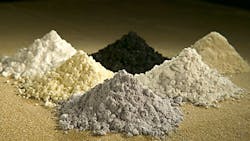Large American manufacturers know there are two prices for rare earths and other critical metals found nearly exclusively in China – a lower price for companies based in China and a higher cost for industrial firms based in America.
In response to this unfair disadvantage, the U.S. filed a case with the World Trade Organization accusing China of limiting exports and raising prices on rare earth elements used in hybrid car batteries like California-based Tesla’s electric car, wind turbines and other components manufactured by such companies as Honeywell; tungsten, which is used for the shaping of metals, alloys, composites and ceramics and for lighting products produced by General Electric; and molybdenum, used in steel and stainless steel manufacturing to increase the strength and hardness of the metal.
In March, the WTO ruled against China and backed the U.S, finding that China’s export limits violate trade rules. That’s the good news. The bad? The WTO ruling is next to impossible to enforce. There’s a better solution, an Innovation Materials Treaty that incentivizes other nations to keep using China’s rare earths rather than find alternatives that would mean billions in lost revenue for China.
Let’s step back for a second.
New Treaty is Needed
Much of the friction between China and the U.S. boils down to which manufacturing giant will control 21st century production of high technology goods. Neither can or will given the size of their respective economies. China will control the essential raw materials because that is where the deposits are located. If China makes it impossible for the U.S. to compete by charging it unreasonably high prices for these materials, the U.S. will have no opportunity to exploit the technologies it invents, stifling innovation globally. An agreement must be reached that allows all the world’s technology driven economies frictionless access to critical raw materials such as rare earths that always will be controlled by China.
Yes, the WTO ruling against China demonstrates the inadequacy of the treaty to resolve modern day disputes between producing and consuming nations of Innovation Materials such as rare earths. The ruling is a dead end because it requires the court to divine the purpose behind export restrictions, such as tariffs and quotas, that are utilized by every industrialized nation, including the U.S., EU and Japan (the complainants in the case).
The treaty was written prior to the advent of countries like China that are both major producers AND consumers of materials essential to high technology manufacturing. China is the first nation in history to use it's near total monopoly on an Innovation Material to unfairly compete with other consuming nations by creating a price differential between the material's cost inside and outside its country; generating domestic manufacturing and jobs at the expense of other nations. It once was all about money. Now it's all about jobs. This was never anticipated when the WTO rules were written. So the WTO provisions allow a country to enact export restrictions for environmental reasons, for example, without having to actually reduce output or total sales domestically.
A new treaty is needed that mandates the unrestricted export of defined "Innovation Materials" once they are sold domestically to anyone, including foreign nationals. Thus, a producing country may reduce total output for environmental reasons but now all buyers, both foreign and domestic, are burdened equally. Electric car and wind turbine makers in the U.S. would pay the same price for neodymium as manufacturers in China do.
You may ask "Why would a nation like China ever enter such an agreement?" The answer is found in something I call "Innovation Distortion." Basically, we now find ourselves in a world where the industrialized nations of the world are spending billions of dollars to find ways to NOT use rare earths. Given China will have a monopoly on rare earths FOREVER in that 90%+ of proven reserves are within its borders, why would it want thousands of the brightest minds on the planet to be funded to find ways to not use rare earths when the same nations could be spending the same money developing new technologies using a material it has perpetual control over?
Rare earths are quite abundant on earth; they're just concentrated within a single nation. Geopolitics, not scarcity, is the issue. This is why such research is a distortion of the innovation process. Every abundant element on the periodic table must be in mankind's innovation tool chest. It is in both the producing and the consuming nations' long term best interest to solve this, and it can only happen with a new international treaty.
It is critical to resolve this now because of the potential domino effect to other nations with sovereign monopolies on other elemental metals essential to innovation. For example, 97% of the world's niobium is isolated within the borders of Brazil. What is to stop Brazil from forcing production of super alloys (which require niobium) into Brazil to create jobs?
I call this new arrangement an "Innovation Materials Treaty.” In short, it would require all signatories to agree that once an Innovation Material is sold within their borders, the material may be removed from the country without any financial or quota restrictions. Thus, China could charge as much as it likes for rare earths taking full advantage of its global monopoly, but all buyers pay the same price. A much fairer win-win arrangement.
Michael Silver is Chairman of the Board and President of American Elements. American Metals is a manufacturers and distributor of engineered and strategi materials.
